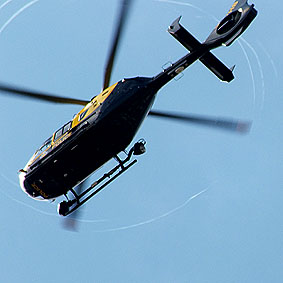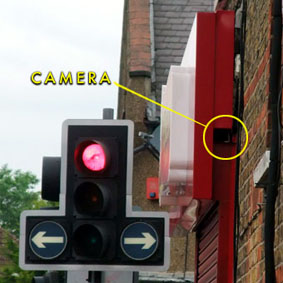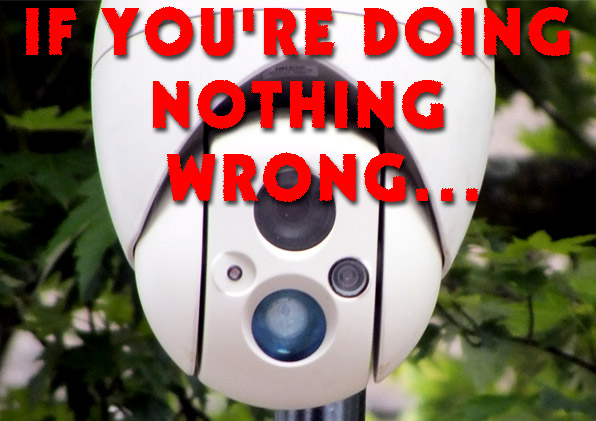 |
 |
|
then
what have you got to be afraid of?"
So the childishly annoying platitude would have us believe. You
must already know this inane, infantile protestation the mainstream
media most frequently offers as defense for the increasing proliferation
of invasive surveillance equipment currently being rolled out at
an ever accelerating rate. Writers who thus feebly try to reassure
us of the benefits of CCTV must surely be far too intelligent and
well educated to honestly believe what they're trying to tell us,
so what is the only logical conclusion we can draw? Yes, it would
seem they've either been duped, in which case they are that stupid
and naive after all, or they've been bought. If the former is true,
then we can happily dismiss their argument as laughable and joyfully
look forward to the day when they can no longer pull the wool over
our eyes - if the latter is the case then it begs the question,
by who? Who's interest is best served by knowing our every move
to the extent that our behaviour can virtually be predicted?
I want to look at this without setting off any alarms by mentioning
CT, thereby giving everyone the opportunity to dismiss me as
a crank and therefore disregard anything I might have to say. I
also want to provide food for thought for anyone else who might
like to present an alternative view which doesn't depend on cliches
or previously discredited suppositions. I want to do this to open
peoples' eyes and minds. I wonder how many people don't believe
in a Conspiracy, but all believe in Conspiracy Theorists. It's a
bit like saying you don't believe in the Devil but you believe in
Devil worshippers.
How about dropping the whole notion of a 'Conspiracy'? That
sounds far too dramatic and has therefore become too easily ridiculed.
Instead, why don't we try using the word 'Observable'? This at least
shows we're taking a calm, rational objective appraisal of our current
situation. Next, we can do away with this whole 'Theory' thing and
replace it with 'Fact'. You know where you are with facts; they're
solid, they're substantial, they're provable. Theories are built
on shifting sand - facts have their feet planted firmly on the ground.
So we'll talk about Observable Facts then.
Now let's think for a moment about the social implications of
staring at people. If I were to stare at you long and hard,
how long would you be prepared to tolerate that and how would you
eventually be inclined to respond? The answer quite clearly is that
you would feel challenged and threatened, all the more so if you
perceived there was no way to stop me. It wouldn't matter if you'd
done anything to invite my stare or not, you would justifiably feel
aggrieved. If you were to react aggressively towards me, any reasonable
observer would say I brought it upon myself by antagonizing you.
This phenomenon is well known in the animal kingdom. Genetically
we're only a couple of percent different from a silverback male
gorilla and their response to direct eye contact is well documented.
To put it simply, continually monitoring people has an unsettling
effect on individuals and therefore a disruptive effect on social
cohesion.
Strangely enough, it seems to have an even more unsettling
effect when the gaze is turned the other way. Recently I decided
to photograph all the cameras along a parade of shops near home.
As well as the sheer number of cameras in such a short space, what
really surprised me was the hysterical reaction of one of the store
managers who put his hand in front of my lens as he started closing
his doors and screaming that he was going to call the police. "Go
on then," I told him, "you do that".
In reply to the rhetorical question "What have we got
to be afraid of", I'm afraid the answer seems to be "That
we might get used to being watched. That we could begin to feel
vulnerable if we're not being continually looked over. That we could
become dependent on the passive gaze of the all-seeing-eye reassuring
us that we've not broken any rule. That in accepting this ever present
supervision, we'll revert to the mental state of babes in prams."
I'm afraid that future generations could so easily be persuaded
that cameras are in some way benign, that they watch over us and
protect us, that we are not safe without them. I'm afraid they could
be deified as totemic icons. But then, what if the Camera is a jealous
God?
Above
all I'm afraid that in an act of capitulation we might internalize
this perpetual invigilation and begin to police ourselves in accordance
with what we perceive to be expected of us. In other words it becomes
an add-on to our Super Ego (that part of our psyche best seen as
an embodiment of parental influences), thus acting as a kind of
Over Super Ego.

|
|
 |
 |
|
Of
course this phenomenon is nothing new - it has
been the foundation stone of all religions since time
immemorial. The only difference is that now it might be truly
possible to understand what the Wrath of God feels like.
The day after writing these last two paragraphs I reached
page 215 of "Greetings from Bury Park" by Sarfraz
Manzoor. I hope Mr. Manzoor doesn't mind me quoting this and
might appreciate why I consider it relevant: "The Koran
that my brother and sister had read had its own section in
the display cabinet. It had been brought to England by my
father when he had left Pakistan in the early sixties and
it had remained with him throughout the decade as he moved
jobs and homes. There was a rigid code of behaviour relating
to the Koran: while it was in the cabinet we could not turn
our back to it, point our feet in its direction or hold it
without first washing our hands. Even before I had started
reading it, the Koran exerted potent power over me, continually
reminding me that I was not a good Muslim. The quotations
on the wall and the Koran in the cabinet gave the impression
that Allah was always watching me, aware of every lapse into
sinfulness." I don't see this as a criticism of any one
particular religion, more an example of how aspects of religions
have been used to pacify, manipulate and finally disenfranchise
entire populations in less enlightened times. I also see it
as a metaphor for what appears to be happening right here,
right now, right under our noses.
If the number cameras on show seems alarming, then
look for the ones you can't see. Next time you're waiting
at the counter of your favourite take away, look at their
CCTV monitor and try to work out where each of the frames
is being viewed from. I did this recently. There was one view
along the road that intrigued me. The next few times I walked
past there I looked all over the shop front but couldn't see
a lens facing anywhere near that direction. The only place
this frame could have been viewed from was a small dark hidden
recess in the fascia, so that is obviously where the camera
had been concealed. All this surveillance equipment doesn't
come cheap - who pays for it? This place is on a busy road
junction, but since a competitor opened on the opposite corner,
they have virtually no customers. Sometime I must drop in
on the opposition and check out their multiplex. Maybe they're
better connected.
It seems like we're being taught to be afraid. This
could work one of two ways. Either the ever increasing number
of cameras is meant as a sign that something really bad could
happen to us and therefore we need protection. Or, as their
very presence can seem so threatening, maybe their function
is as much to act as the manifestation of a malevolent authoritarian
state which we are powerless to challenge. It doesn't really
matter if all of them are 'live' or not; it's the message
that counts, and the message quite clearly is "We have
the right to watch everything you do: we intend to know everything
there is to know about all of you: we own you."
Overkill. In a short service road between a night club
and a car park I counted 8 cameras all covering the same space
and covering each other like a well choreographed paranoid
SWAT team. If these are supposed to in some way reassure us,
they're doing a damn bad job of it. What are they telling
us? "It's a really dangerous place out there but don't
worry; we'll have a blow by blow account on video as they
ship you off to A&E. Sorry we couldn't afford to put any
officers on the street to protect you but hey, lighten up,
now your famous." I even saw cameras in matching casings
side by side up against the same wall - get a room!
Earlier I raised the question "Who's interest is best
served by knowing our every move?" The simple answer
would seem to be 'The State'. Any State, or just one in particular?
This isn't as facile a question as it at first sounds. What
does the term 'National Debt' mean? In order for a country
to be in debt, someone must have lent it money (which was
probably borrowed in the first place). This means that every
Sovereign State on this planet owes money to one of a handful
of extremely rich, and therefore proportionally powerful organizations.
These organizations see the loans they make as an investment
in their futures and so naturally want to protect their interests.
That means taking control of the affairs of their customers
in order to manage them in a way that best secures a good
return (we're all familiar with the term 'Working for the
Bank'). Where do you think the peoples' will comes into any
of this? How do you think these organization are going to
see calls for decent living conditions, democracy, socialism
and an end to mass exploitation? Let's get real; would they
see an informal unarmed mob as a serious threat to their long
term business plan, or merely a minor inconvenience?

|
|
 |
 |
|
So
far I have put together a picture of our current situation
without further reference to either Conspiracy Theories in
particular, or The Illuminati, New World Order, World Governance,
Googlement, Bilderberg, Tabula Rasa, Secret 'Black' Agencies
or Aliens in general. I don't need to. The facts tell us all
we need to know about the state of play so far and therefore
what the game plan is likely to be. We don't need to demonize
those in power; their actions speak louder than anything we
can say about them. The question we need to ask is "What
else can we do to change the endgame?"
I sometimes feel one option could be to give them more
information than they could ever have dreamed of. Our current
economic mess has been hastened by flooding the market with
worthless stock, then attempting to compensate by printing
worthless money. Would it be possible to devalue information
by providing too much information; false information, contradictory
information, useless information? What if it turned out that
about fifty percent of people on all databases were really
virtual? Merely bogus duplicates replicating a few salient
details of genuine identities, but falsifying the rest in
order to muddy the waters. Sure, they could sift through the
smoke eventually and find out what's real and what isn't,
but think of all the time and effort it would cost them and
what other important things they might miss in the mean time.
We could make information so worthless that it would be too
costly to attempt to evaluate its validity. In short, we could
make the machine sick on a surfeit of information.
Everything cameras record goes into a database. All
movements of people and behavioural patterns are catalogued
and then categorized as those which fall within the realms
of normative and those which are unusual enough to be considered
suspect. The suspect category is the one scrutinized in close
detail. This all takes time, their time - so get random! Facial
recognition software is supposed to be their secret weapon
- make it their Achilles heel. Make them waste their time
trying to find out who you are. Draw attention to yourself
simply by being out of the ordinary. Make yourself a walking
decoy, after all "If you're doing nothing wrong, then
what have you got to be afraid of?" As we have given
away our right to privacy, we can also give up any hope of
ever getting it back. Our best hope is to make much of the
information held about us meaningless and therefore virtually
useless.
On the face of it, "If you're doing nothing wrong,
you've got nothing to be afraid of", could sound quite
reasonable. But what if the rules change? What if actions
in keeping with some of the most basic tenets of a free and
open democratic society are no longer deemed reasonable. Actions
such as having an independent opinion contrary to the Party
line and claiming the right to openly express it. Actions
such as raising awareness of the possibility of a hidden agenda.
Actions such as expressing doubts and presenting evidence
to cause others to question the honesty and integrity of our
Government. We currently enjoy all these privileges because
our predecessors considered them worth dying for and were
prepared to pay the ultimate price. How many of us would be
selfless enough to make that same sacrifice? I have always
felt that if you wouldn't be prepared to kill and clean an
animal with your own hands, you don't have the right to eat
its flesh. By the same token, if you roll over in submission,
don't come crying to me when you get your throat ripped out.
I've never been particularly happy with the Christian
notion of the Good Shepherd. There are only two reasons why
we keep sheep - to repeatedly fleece them, then eat them.
Neither seem like good career moves. For a less charitable
view of the situation, consider the role of the Morlocks and
the Eloi in The Time Machine by H.G. Wells. Herbert George
was no fool, he saw what was coming a mile off. He just extended
the time scale thereby putting the dreadful future beyond
the realm of imminent possibility to be seen, for the time
being at least, only as a cautionary metaphor or a veiled
revelation. But then the Twenty First Century turned a zoom
lens on conventional notions of time and social change with
the apparent ease of fast forwarding a film. And now here
we are - living in an overlaid plethora of different Dystopias
dreamed by a handful of visionaries in their collective worst
nightmare. The one thing we have in our favour is our number
- in fact, that's probably our only card worth playing at
this late stage of the game. Do we accept the way things look
like going or do we pool our collective resources and find
ways to change our future for the better? We need to play
our card now, before it gets trumped.
© Chris Klein August 2013

|
|
 |
 |
|
|
|
